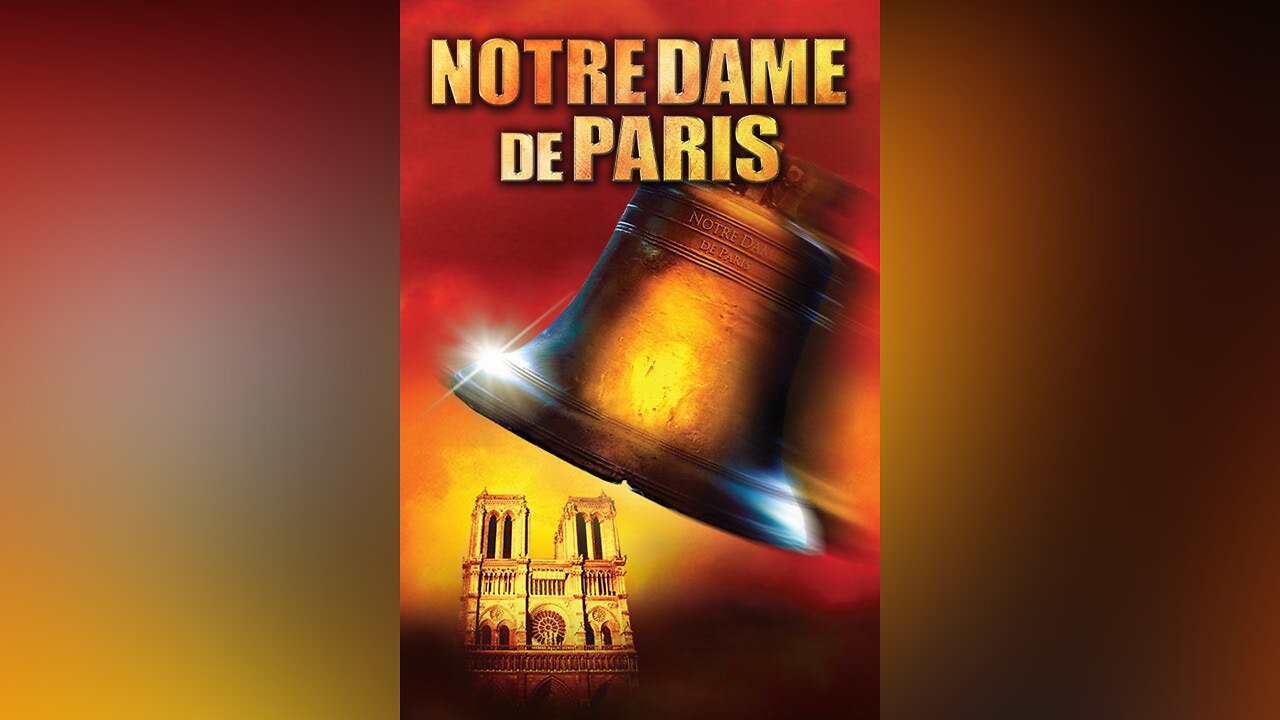Premium Only Content

Notre-Dame de Paris (1999 Musical - Act I)
Notre-Dame de Paris is a sung-through French musical which debuted on 16 September 1998 in Paris. Audio in French with English subtitles.
It is based upon the novel Notre-Dame de Paris (known in English as The Hunchback of Notre-Dame) by the French novelist Victor Hugo. The music was composed by Riccardo Cocciante (also known as Richard Cocciante) and the lyrics are by Luc Plamondon.
Since its debut, it has been professionally played in Belgium, Canada, China, France, Italy, Japan, Lebanon, Luxembourg, Poland, Russia, Singapore, South Korea, Spain, Switzerland, Taiwan, Turkey, United Kingdom and United States, and has been translated into eight languages (English, Spanish, Italian, Russian, Korean, Flemish, Polish, and Kazakh). A shorter version in English was performed in 2000 in Las Vegas, Nevada (United States) and a full-length London production, also in English, ran for seventeen months. Several songs from the show, such as "Vivre", "Belle" and "Le temps des cathédrales", have been released as singles with a huge success in French speaking countries. As of 2022, two original stars, Daniel Lavoie and Bruno Pelletier played Gringoire and Frollo in Canada.
Notre-Dame de Paris, according to the Guinness Book of Records, had the most successful first year of any musical ever.
Act I: The story is set in Paris in the year 1482. The poet Gringoire, who throughout the story acts not only as a participant but also as a sort of commentator, enters to set the scene for the story; he relates how Man has written his history in the building of the cathedrals ("Le temps des cathédrales").
The homeless and refugees, led by Clopin, swarm before the entrance to the Cathedral of Notre Dame begging for help and sanctuary ("Les sans-papiers"). Frollo, the Archdeacon of Notre Dame, orders Phoebus, the Captain of the Royal Archers, to have his men disperse the crowd ("Intervention de Frollo"). As his men are driving off the refugees, Phoebus catches sight of the beautiful Romani girl Esmeralda (in later productions, the scene changes to have him see her while she is dancing before Notre Dame) and is entranced by her. Esmeralda tells him about herself, her life as a Traveller, and her dreams ("Bohémienne"). Instead of arresting her, Phoebus leaves her alone.
Clopin, who has watched over Esmeralda since she was eight years old after the death of her parents, tells her that she is no longer a child and that she has reached the age where she will discover love ("Esmeralda tu sais"). He warns her to be extremely careful, since not all men are to be trusted.
In the next number, the audience is introduced to the nobly-born and beautiful Fleur-de-Lys, to whom Phoebus is engaged to be married. Fleur-de-Lys's love for Phoebus is childish and irrational, like that of Juliet for Romeo ("Ces diamants-là").
Now begins the wild and coloured Feast of Fools, presided over by Gringoire ("La fête des fous"), the climax of which is the choosing of the King of Fools from among the group of people who can make the ugliest face; the King will be crowned by Esmeralda. Hiding in the shadows is a monstrous figure who is dragged out into the light; it is the bell-ringer of Notre Dame, the hunchbacked and facially deformed Quasimodo. By unanimous decision, Quasimodo is chosen and crowned as the King of Fools, but he knows that for all the power he has this one day nothing can make a woman such as Esmeralda care for him ("Le pape des fous").
Frollo breaks up the festivities and orders Quasimodo to kidnap Esmeralda and bring her to him that night so that she can be imprisoned as a sorceress and a violator of public decency ("La sorcière"). Quasimodo, who is devoted to Frollo for raising and educating him after he had been abandoned as a baby ("L'enfant trouvé"), says he will obey.
Night falls on Paris with its dark and hidden secrets commented on by Gringoire ("Les portes de paris"). Quasimodo stalks Esmeralda through the dark streets and is about to seize her when Phoebus and his guards arrive and arrest Quasimodo. Phoebus introduces himself to Esmeralda. He makes a date for a rendezvous with her the next night at the Cabaret du Val d'Amour. Phoebus and his men take Quasimodo away and Esmeralda darts off into the darkness ("Tentative d'enlèvement").
At the Court of the Miracles, the haven for all of the outcasts of Paris, Clopin presides over a wild revel, remarking that all are truly equal here no matter their race, religion, skin color or criminal background ("La cour des miracles"). Gringoire, who has wandered in accidentally, is seized and Clopin tells him that he will be hanged for his trespassing – unless one of the women will agree to marry him. Esmeralda who has arrived during this, agrees to marry Gringoire (in name only) and Clopin, as King of the Outcasts, unites them and they join in the wild revelry.
Later, when Gringoire and Esmeralda are left alone ("Le mot Phoebus") he introduces himself to her as "the Prince of the Streets of Paris" and assures her that while he is not a "ladies' man" ("un homme a femmes"), he would be glad if she would be his Muse and inspiration. Since Gringoire is educated, Esmeralda asks him what the word "Phoebus" means; he tells her that in Latin it means "the sun" or "sun god". Esmeralda muses on the word as it romantically relates to the man Phoebus ("Beau comme le soleil"); she is joined on stage by Fleur-de-Lys, who also muses on Phoebus (although she seems to be more apprehensive about him), but both believe that Phoebus will love them forever.
Phoebus himself is under no apprehensions about what kind of man he is – he wants both women, one as a wife and one as a temporary mistress ("Déchiré").
The next day, Frollo summons Gringoire to Notre Dame and questions him about Esmeralda, forbidding him to touch her. Gringoire changes the conversation by asking about a strange inscription in Greek on the wall of the Gallerie des Rois in Notre Dame, the word "Ananké". Frollo tells him that "Ananké" means "Fate" in Greek. They watch as Quasimodo is dragged on stage bound on The Great Wheel as sentence for his attempted kidnapping of Esmeralda ("Anarkia").
Quasimodo endures his punishment, but cries out for water ("A boire"), a plea that is ignored by everyone. Suddenly Esmeralda appears and gives him a drink of water from her cup, an act of kindness that deeply touches the poor hunchback. He is then released from the Wheel, and he, Frollo and Phoebus sing about their different feelings for Esmeralda ("Belle"): Quasimodo about his growing feelings of tenderness for her, Frollo about his growing fascination for her, and Phoebus (watched jealously by Fleur-de-Lys) about his wish for an affair with her before he marries Fleur-de-Lys.
Quasimodo leads Esmeralda into Notre Dame and tells her how the cathedral has been his home and sanctuary, and now it can be hers whenever she needs one ("Ma maison c'est ta maison"). In spite of her initial fear of this strange, deformed man, Esmeralda is touched by his gentleness and finds herself warming towards Quasimodo. Left alone, Esmeralda, who has never prayed before, prays to the Virgin Mary ("Ave Maria païen"), while Quasimodo thinks of her ("Si tu pouvais voir en moi"). Frollo, secretly spying on Esmeralda, realizes that his lust for her will destroy him, but knows that he cannot resist nor does he want to ("Tu vas me détruire").
That night, Phoebus is on his way to the Cabaret du Val d’Amour for his rendezvous with Esmeralda when he realizes he is being stalked by a shadowy figure. The figure (Frollo in disguise) warns him to go no further ("L'ombre"), but Phoebus refuses to heed the threat and continues on his way.
At Val d’Amour, Gringoire (who seems to be a regular customer) remarks how everyone, no matter the race, creed or color, comes here for a good time of one kind or another ... for a very low price ("Le Val d’Amour"). Phoebus arrives (he seems to be a regular customer here too) and meets Esmeralda in a private room ("La volupté"). They embrace and are about to make love when Frollo rushes in and stabs Phoebus with Esmeralda's knife (which she had placed on the floor earlier). Esmeralda collapses over Phoebus’ body, Frollo makes his escape and Gringoire, Clopin, Frollo, Quasimodo and the Chorus comment on the terrible power of Fate ("Fatalité").
-
 45:45
45:45
Adaneth - Arts & Literature
14 days agoBeethoven: Symphony No.3 'Eroica' | John Eliot Gardiner & Orchestre Revolutionnaire et Romantique
43 -
 LIVE
LIVE
RalliedLIVE
1 hour ago $0.33 earnedHIGH OCTANE WARZONE SOLOS ALL DAY
199 watching -
 2:22:10
2:22:10
Nick Freitas
2 hours agoChurchill, Franco, and Rhodesia: Rethinking the Villains and Heroes of History
1514 -
 13:01
13:01
Professor Gerdes Explains 🇺🇦
4 hours agoUkraine in Turmoil: MASSIVE PROTESTS Against Zelensky ERUPT Nationwide
4.36K -
 1:43:11
1:43:11
Redacted News
3 hours agoBREAKING! TRUMP DECLARES WAR ON OBAMA "TREASON" AS A DEEP STATE RINGLEADER IN RUSSIA HOAX | REDACTED
135K123 -
 1:22:13
1:22:13
Michael Franzese
4 hours agoPablo Escobar’s Son Breaks Silence About His Father, Narcos, and The Cartel
34.7K8 -
 LIVE
LIVE
SpartakusLIVE
1 hour agoThe $1,000 Spartakus Gauntlet || Huskerrs and Twitty
93 watching -
 9:02
9:02
Hollywood Exposed
3 hours agoPiers Morgan's Guests ROAST DC's New Superman - It’s A Trainwreck!
12.1K4 -
 LIVE
LIVE
GSLouise
3 hours agoFIRST RUMBLE STREAM go easy on me
57 watching -
 LIVE
LIVE
Spartan
4 hours agoSpartan - Pro Halo Player for OMiT | Scrims vs Unreal Nightmare
19 watching